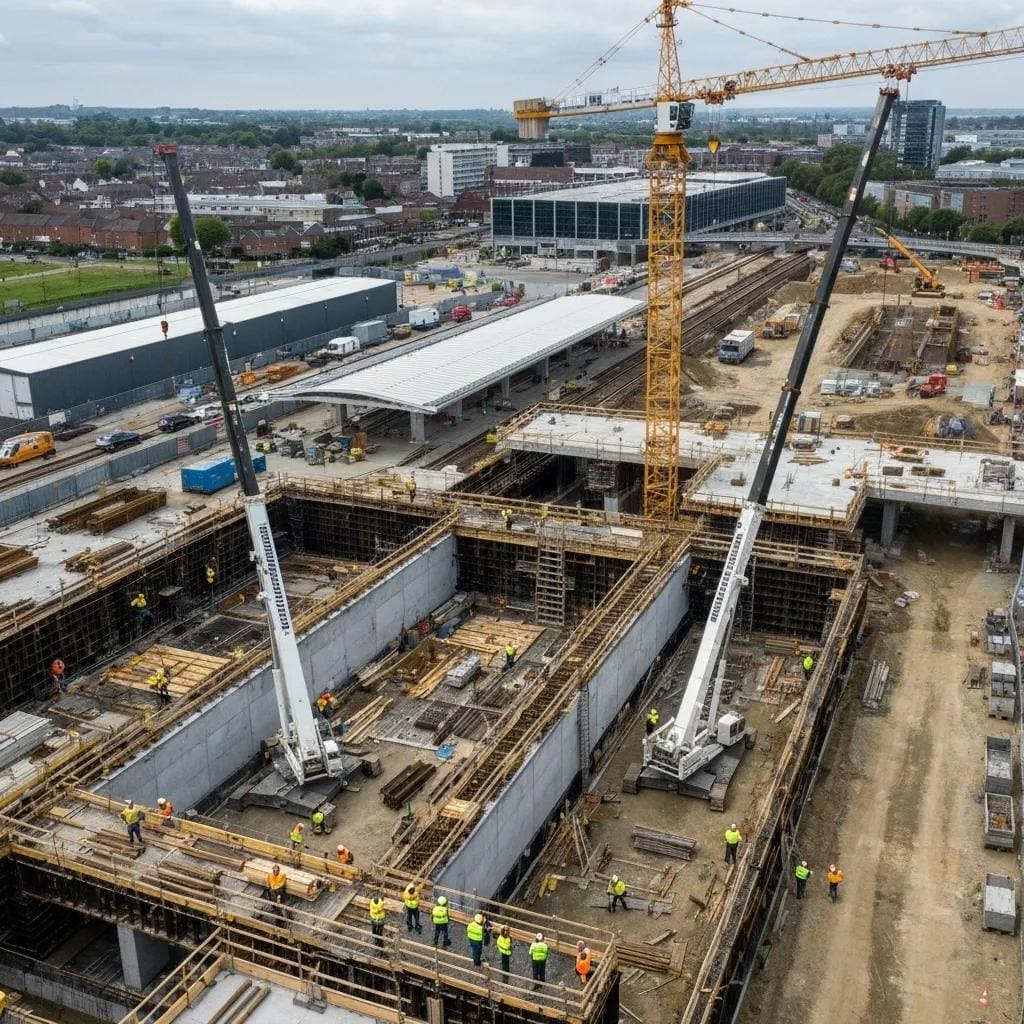How to Speed Up the Planning Application Process in Cardiff 2025: Expert Tips to Reduce Delays and Expedite Approvals
Cardiff developers frequently face planning delays that stall construction timelines, inflate costs, and frustrate stakeholders. This guide delivers actionable strategies and insider insights to tackle planning delays in Cardiff head-on, promising a more efficient route to approvals. You’ll discover the root causes of hold-ups, the power of pre-application advice, key legislative changes for 2025, dialogue best practices with Cardiff Council, appeals protocols, real-world infrastructure case studies, and forward-looking trends that will shape faster decisions. By blending expert procedural guidance with a streamlined consultancy approach, you can transform prolonged waits into on-time permissions and keep your project momentum on track.
What Are the Common Causes of Planning Application Delays in Cardiff?
Planning application delays in Cardiff occur when procedural requirements, policy reviews, or incomplete submissions extend determination periods. Delays undermine project schedules by triggering extra consultations, re-submissions, or appeals. For instance, missing biodiversity statements can add weeks to validation, while unclear design details prompt further inquiries from Cardiff Council.
Before examining specific factors, the table below summarises principal delay drivers:
| Delay Factor | Mechanism | Impact |
|---|---|---|
| Incomplete Documentation | Omissions in plans or statements | Validation hold-ups |
| Policy Incompatibility | Non-compliance with Welsh planning frameworks | Additional policy reviews |
| Statutory Consultation | Extended public or technical consultations | Extended referral periods |
| Resource Shortages | Limited planning officer capacity | Longer decision windows |
These delay factors often overlap, prompting users to address each proactively before submission. Understanding these causes leads directly into the detailed roles played by specific entities.
Which factors contribute most to planning delays in Cardiff projects?
The main contributors to planning delays in Cardiff projects are:
- Omitted Green InfrastructureStatements – Missing biodiversity net-gain evidence stalls policy compliance checks.
- Insufficient Design Details – Vague elevation drawings force repeated officer queries.
- Poor Pre-Application Engagement – Lack of early advice increases risk of non-validation.
Addressing these three high-impact factors early reduces the likelihood of repetitive clarifications and paves the way for smoother correspondence with planning officers.
How do Cardiff Council procedures impact application timelines?
Cardiff Council processes every application through validation, consultation, and determination. Stringent plan checks during validation ensure statutory requirements are met but add time when documentation is incomplete. Subsequent committee reviews for major developments can extend decision periods beyond the standard eight-week target, especially when specialist reports (e.g., transport assessments) are required. Optimising this process starts with meeting validation criteria and scheduling timely pre-application meetings to align with officer capacity and committee cycles.
What role does Welsh Government policy play in planning delays?
Welsh Governmentpolicy, notably PlanningPolicyWales Edition 12, mandates net-gain biodiversity statements and sustainable drainage strategies. These requirements safeguard environmental quality but introduce new deliverables that applicants must address. When a submission omits required statements, the planning authority requests additional details, triggering referral delays. Early incorporation of national policy components into designs not only enhances compliance but also builds credibility, accelerating assessment phases and reducing iteration loops.
Planning Policy Wales. Edition 12. February 2024
PlanningPolicyWales Edition 12, published in February 2024, sets out national land use planningpolicy for Wales. It includes a revised Chapter 6 that mandates all new developments to deliver a “Net Benefit for Biodiversity” (NBB) and enhance ecosystem resilience, requiring a Green Infrastructure Statement with all planning applications to demonstrate compliance.
How Can Pre-Application Advice Help Expedite Planning Permission in Cardiff?

Engaging Cardiff Council’s pre-application advice service provides structured feedback that clarifies policy requirements, highlights potential issues, and outlines necessary documentation. This early alignment reduces the risk of application rejection or referral, improving overall processing speed and boosting approval certainty. Here is a full article on how you can ‘simplify the whole Cardiff planning application process.’
Consider the following preparatory checklist:
| Document | Purpose | Benefit |
|---|---|---|
| Design and Access Statement | Explains design rationale and accessibility measures | Demonstrates policy compliance and clarity |
| Green Infrastructure Statement | Details biodiversity net-gain proposals | Avoids environmental referrals |
| Preliminary Transport Assessment | Assesses traffic and parking impacts | Minimises highways authority queries |
| Site Investigation Report | Validates ground conditions | Reduces technical queries on contamination risks |
What are the benefits of engaging Cardiff Council’s pre-application service?
Pre-application service engagement enhances clarity on policy compliance, flags potential objections early, and identifies precise technical requirements. This iterative feedback process reduces unexpected requests during the formal application, accelerates validation, and aligns project scope with local planning officer expectations, ultimately shortening the path to approval.
How to prepare a robust planning application to avoid delays?
To assemble a complete application package:
- Collate all mandatory statements and impact assessments in line with PlanningPolicyWales.
- Ensure full architectural and landscape plans with clear dimensions and annotations.
- Commission specialist reports (ecology, transport, noise) before lodgement.
- Cross-check submission against the Council’s validation checklist to confirm completeness.
Completing these steps mitigates common validation setbacks and fosters an uninterrupted review process.
Why is submitting a Green Infrastructure Statement essential for faster approval?
A Green Infrastructure Statement satisfies national biodiversity net-gain requirements, demonstrating how the development will enhance urban ecosystems. This document prevents environmental referrals and aligns with Welsh Government sustainability goals, eliminating a key source of delay and fostering confidence in the planning authority’s environmental assessments.
What Are the Key Changes in Welsh Planning Legislation Affecting Cardiff in 2025?
The Planning (Wales) Bill, Infrastructure (Wales) Act 2024, and Edition 12 of PlanningPolicyWales collectively streamline procedures, consolidate policy, and set new performance targets. These reforms aim to reduce complexity, expedite decision-making, and reinforce local authority capacity. You can also check out all of the common planning permission pitfalls here.
| Legislation | Change | Effect |
|---|---|---|
| Planning (Wales) Bill | Consolidates multiple planning Acts | Simplifies legal framework and approval pathways |
| Infrastructure (Wales) Act 2024 | Designates major development thresholds | Introduces faster determination targets for large projects |
| Planning Policy Wales Edition 12 | Mandates net-gain biodiversity and sustainable drainage | Standardises submission requirements and prevents policy referrals |
Consolidation of planning law
The Planning (Wales) Bill, introduced to the Senedd in September 2025, aims to consolidate existing planning legislation into a single, bilingual Act. This process is a technical consolidation designed to modernise the structure and language of planning law, making it more accessible and easier to understand without altering its legal effect or underlying policy.
How will the Planning (Wales) Bill streamline the planning process?
The Planning (Wales) Bill unifies existing statutes into a single Act, removing redundant procedures and clarifying authority responsibilities. By simplifying legislative language and consolidating consultation requirements, the Bill promotes faster decision-making and reduces legal ambiguities that previously triggered extended review periods.
Infrastructure (Wales) Act 2024
The Infrastructure (Wales) Act 2024, which received Royal Assent on June 3, 2024, modernises and simplifies the process for developing significant infrastructure projects in Wales. It establishes a unified “infrastructure consent” process, replacing previous complex regimes, with the goal of speeding up approvals and providing greater consistency and certainty for major developments.
What implications does the Infrastructure (Wales) Act 2024 have for major developments?
The Infrastructure (Wales) Act 2024 establishes dedicated fast-track routes for developments of national significance and large-scale infrastructure. Projects meeting defined thresholds benefit from condensed referral windows, allocated senior planner oversight, and clear performance benchmarks that aim for decisions within 13 weeks, substantially faster than traditional timelines.
How does Planning Policy Wales Edition 12 influence application requirements?
Edition 12 enforces comprehensive sustainability assessments, including mandatory Green Infrastructure Statements, climate resilience measures, and sustainable drainage strategies. By embedding these requirements into a unified policy document, Edition 12 reduces interpretation disparities and enables applicants to prepare fully compliant evidence, eliminating iterative policy referrals and accelerating approval.
How to Effectively Communicate and Engage with Cardiff Council to Speed Up Applications?
Transparent communication with planning officers and proactive management of consultations foster trust and streamline application reviews. Early dialogue clarifies expectations, allows quick resolution of technical questions, and builds a collaborative atmosphere that supports faster decisions.
Effective engagement encompasses:
- Structured Officer Meetings – Arrange pre-application sessions with clear agendas and documented action points.
- Regular Progress Updates – Supply concise written updates on revisions and responses to officer queries.
- Prioritised Technical Briefings – Provide early access to specialist reports for highways, ecology, and heritage teams.
Maintaining open channels with Cardiff Council maximises procedural transparency and aligns all stakeholders on project milestones.
What are the best practices for liaising with Cardiff Council planning officers?
Adopt a respectful, solution-focused approach by preparing concise briefs, anticipating officer concerns, and responding promptly to information requests. Document verbal agreements in writing to ensure clarity and prevent misunderstandings, and schedule follow-up meetings to verify that all policy and technical notes are addressed before formal submission.
How to manage statutory consultations efficiently during the application process?
Plan consultation timelines in parallel with application preparation by:
- Identifying required consultees (natural resources, highways, heritage).
- Issuing draft documentation early for technical feedback.
- Integrating consultee comments into revised submissions swiftly.
This systematic approach reduces referral cycles and aligns stakeholder inputs with the planning authority’s review schedule.
Which digital tools can streamline planning application submissions in Cardiff?
Digital planning portals and document-management platforms enable seamless lodgement of plans, automated validation checks, and real-time status tracking. Leveraging these tools ensures version control, fast electronic consultations, and immediate notification of missing documents, minimising administrative delays. Here you can see how the Cardiff planning application process works
What Steps Should You Take if Your Planning Application Is Refused or Delayed in Cardiff?
When an application is refused or delayed, understanding appeal procedures and post-decision strategies is vital to restoring momentum. Appeals before Planning and Environment Decisions Wales (PEDW) and resubmissions provide structured avenues to overturn or rectify decisions.
| Action | Purpose | Outcome |
|---|---|---|
| Lodge Appeal with PEDW | Challenge refusal decisions | Potential reversal or modification of refusal |
| Commission Additional Evidence | Address refusal reasons (e.g., design, ecology) | Strengthened case for resubmission or appeal |
| Resubmit Revised Application | Integrate PEDW or officer comments | Renewal of determination period with improved documentation |
How does the Planning Appeal Process with PEDW work?
The PEDW appeal process begins with submitting a Notice of Appeal followed by a Statement of Case outlining reasons for challenge. An inspector reviews the submission, may hold a hearing or inquiry, and issues a decision. Timelines typically range from 12 to 16 weeks, with faster routes for minor householder appeals.
What strategies improve success rates for planning appeals in Cardiff?
To maximise appeal success:
- Targeted Evidence – Provide focused responses to each refusal ground with technical reports.
- Expert Witness Statements – Enlist planning or heritage specialists to present professional opinions.
- Dialogue with Inspectors – Seek early meeting opportunities to clarify complex issues.
These tactics demonstrate rigorous compliance and address decision-makers’ concerns directly.
When and how should you resubmit a refused planning application in Wales?
Resubmissions are best filed after incorporating appeal or officer feedback and conducting fresh community consultations where required. Ensure all revised documents align with Welsh planningpolicy and validate against Cardiff Council’s submission checklist to prevent repeated refusals.
How Are Major Infrastructure Projects in Cardiff Influencing Planning Application Speed in 2025?

High-profile schemes like the Cardiff Central Station revamp and Cardiff Parkwayhave demonstrated how strategic planning and stakeholder collaboration reduce approval lags. Lessons from these projects inform best practices for future developments, underscoring the importance of integrated design, early engagement, and streamlined reporting.
| Project | Strategy | Result |
|---|---|---|
| Cardiff Central Station Revamp | Single-source lead consultancy and design team | Approval granted in 10 weeks for core infrastructure |
| Cardiff Parkway Station | Joint Welsh Government-Council project board | Consistent policy alignment and 12-week determination |
What lessons can be learned from the Cardiff Central Station revamp approval?
Co-located design and planning teams ensured real-time coordination, rapid resolution of policy queries, and a single consolidated submission. This unified approach cut decision timing by one-third compared to separate consultancy models.
How did the Cardiff Parkway station project navigate planning delays?
Early establishment of a project board comprising Welsh Government, Cardiff Council, and technical advisors aligned policy interpretation, facilitated rapid peer reviews, and secured senior planner sign-off, thus maintaining the determination target despite complex ecology requirements.
What role does efficient planning play in supporting Cardiff’s economic growth?
Swift approvals for major infrastructure accelerate job creation, enhance connectivity, and boost investor confidence, positioning Cardiff as a competitive hub for sustainable development and long-term prosperity.
What Future Trends and Reforms Will Affect Planning Application Efficiency in Cardiff?
Emerging reforms like increased planning fees reinvested into Council resources, new senior planner roles, and ongoing digital public service enhancements promise to further accelerate approvals. By preparing for these shifts now, applicants can maintain a competitive edge and anticipate evolving requirements.
| Trend | Mechanism | Benefit |
|---|---|---|
| Full Cost-Recovery Fees | Reinvestment into planning staff and technology | Shorter officer response times |
| New Senior Planner Roles | Dedicated oversight for complex and major schemes | Consistent leadership and faster escalation paths |
| Enhanced Digital Public Services | AI-driven plan validation and stakeholder portals | Automated checks and real-time application status |
How will increased planning fees and reinvestment improve service speed?
Reinvested fees fund additional officer recruitment, specialist training, and upgraded digital systems, collectively reducing backlog and improving turnaround times for both standard and major development applications.
What impact will new senior planner roles have on application processing times?
Senior planners provide expert decision-making, supervise complex applications, and streamline escalation procedures, ensuring that high-priority or large-scale projects receive timely leadership attention and fewer administrative bottlenecks.
How can applicants prepare for ongoing digital public service improvements?
Applicants should familiarise themselves with evolving e-submission portals, integrate GIS mapping into designs, and leverage automated validation tools to pre-check documentation, ensuring seamless compatibility with new digital workflows and minimising manual corrections.
By embracing these expert tips, Cardiff developers can transform planning delays into predictable, on-time approvals, keeping projects on schedule and unlocking the city’s potential.
Frequently Asked Questions
What should I do if my planning application is delayed?
If your planning application is delayed, first check the status through Cardiff Council‘s online portal. Understanding the reasons for the delay is crucial; it may be due to missing documentation or the need for additional consultations. Engage with your planning officer to clarify any outstanding issues and provide any requested information promptly. If necessary, consider submitting a formal inquiry to expedite the process. Keeping open lines of communication can often help resolve delays more efficiently. If you need expert help here we give our hassle freeplanning permissions service that takes care of everything for you in Cardiff and South Wales.
How can I ensure my planning application meets all requirements?
To ensure your planning application meets all requirements, start by thoroughly reviewing Cardiff Council‘s validation checklist. This checklist outlines all necessary documents and information needed for a complete submission. Additionally, consider engaging in pre-application advice sessions with the council, where you can receive tailored feedback on your plans. Collaborating with experienced professionals, such as architects and planners, can also help you prepare a robust application that aligns with local policies and regulations.
What are the consequences of submitting an incomplete application?
Submitting an incomplete application can lead to significant delays in the planning process. Incomplete submissions often result in validation hold-ups, requiring additional time for the council to request missing information. This can extend the overall determination period, causing frustration and potential financial implications for your project. Moreover, repeated requests for information can damage your credibility with planning officers, making it essential to ensure all documentation is complete and accurate before submission.
How can I effectively manage community consultations during my application process?
To effectively manage community consultations, start by identifying key stakeholders and potential consultees early in the process. Prepare clear, concise materials that outline your project and its benefits. Schedule consultations well in advance and provide ample time for feedback. Actively listen to community concerns and be prepared to address them in your application. Document all feedback and how it has been incorporated into your plans, as this demonstrates responsiveness and can help mitigate objections during the formal review process.
What role does public engagement play in the planning application process?
Public engagement plays a critical role in the planning application process by fostering transparency and building trust between developers and the community. Engaging with local residents and stakeholders allows you to gather valuable insights and address concerns early on, which can lead to smoother approvals. Effective public engagement can also reduce opposition to your project, as community members feel heard and involved in the decision-making process. This proactive approach can ultimately enhance the likelihood of a successful application.
What are the benefits of using digital tools for planning applications?
Utilising digital tools for planning applications offers numerous benefits, including streamlined submission processes and enhanced communication with planning officers. Digital platforms often provide automated validation checks, ensuring that your application meets all requirements before submission. They also allow for real-time tracking of application status, reducing uncertainty and improving transparency. Additionally, digital tools can facilitate easier collaboration with stakeholders, making it simpler to share documents and receive feedback throughout the planning process.
How can I stay updated on changes in planning legislation affecting Cardiff?
To stay updated on changes in planning legislation affecting Cardiff, regularly check the Cardiff Council website and subscribe to their newsletters or alerts. Engaging with local planning forums and attending community meetings can also provide insights into upcoming legislative changes. Additionally, following relevant social media channels and professional networks can help you stay informed about new policies and best practices. Networking with industry professionals can also offer valuable perspectives on how changes may impact your projects.
Conclusion
By implementing the strategies outlined in this guide, Cardiff developers can significantly reduce planning application delays and enhance project efficiency. Understanding the key factors that contribute to delays and engaging proactively with Cardiff Council will streamline the approval process. Embrace these expert insights to ensure your applications are complete and compliant, paving the way for timely approvals. Start your journey towards smoother planning today by exploring our resources and expert consultancy services.




